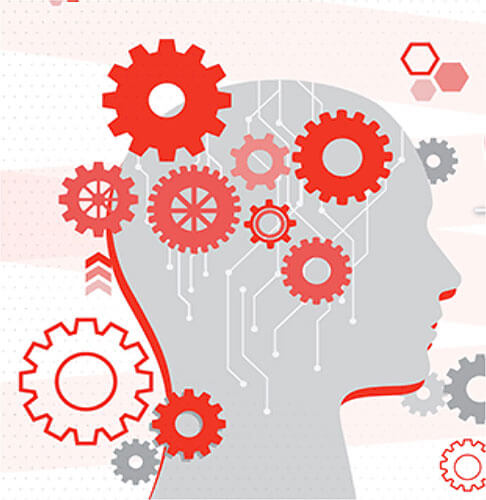
Would you like to start a conversation with other industry leaders to brainstorm a challenge or to just know more on a particular topic?
Engage in online discussions with your Peers
Start NowDoing more with less is the mission of every technology leader. No matter what resources or budgets are allotted, they continuously search for new ways to increase efficiency, speed, and agility.
In scientific terms, AI is a backend algorithm that programs machines to emulate and extend human behaviour and actions.
When new technologies are combined with creativity, they fuel innovation and disruption. Artificial Intelligence (AI) might just be the single largest technology revolution of our live times, with the potential to disrupt almost all aspects existence. Robotic process automation (RPA), when combined with AI, goes beyond simply boosting efficiency and improving productivity in mundane tasks. RPA and AI together can undertake high-value, complex activities with great accuracy. The audit trail is clear and requires minimal human oversight. The use of RPA and AI in shared services is creating new operating models that free up the human workforce to focus on value-adding activities such as high-level analysis, planning, and decision-making. With many industries aggressively investing in cognitive and AI solutions, global investments are forecast to achieve a Compound Annual Growth Rate (CAGR) of 50.1% to reach USD 57.6 billion by 2021.

AI is not a new phenomenon, with much of its theoretical and technological underpinning developed over the past 70 years by computer scientists such as Alan Turing, Marvin Minsky and John McCarthy. AI has already existed to some degree in many industries and government agencies. Now, thanks to virtually unlimited computing power and the decreasing costs of data storage, the world is on the cusp of an exponential age of AI, as organisations learn to unlock the value trapped in vast volumes of data.
AI is a constellation of technologies that enable machines to act with higher levels of intelligence and emulate the human capabilities of sense, comprehension and action. In scientific terms, AI is a backend algorithm that programs machines to emulate
and extend human behaviour and actions. Thus, computer vision and audio processing can actively perceive the world around them by acquiring and processing images, sound and speech. The natural language processing and inference engines can enable AI systems to analyse and understand the information collected. An AI system can also take action technologies such as expert systems and inference engines or undertake actions in the physical world. These ‘human’ capabilities are augmented by the ability to learn from experience and keep adapting over time. AI systems are finding ever-wider application to supplement these capabilities across enterprises as they grow in sophistication. Artificial intelligence, due to its digital and dynamic nature, is progressing at an accelerated pace.
A profound impact is also seen on the Shared Service Centers (SSCs) all over the world. By combining transaction functions such as HR, IT, Finance, Procurement, and Legal into a consolidated hub for the entire company, SSCs have delivered significant business value.
Current Trends in Shared Service Centers
With new and innovative technologies available in the market, SSCs are confronted with the need to adapt their way of operating. While the aim of delivering cost effective, high-quality processes will still be valid for SSCs in the future, the way SSCs operate to deliver these processes is changing.
Looking at current SSC processes, due to the often-used lift and shift approaches, many organizations are still confronted with non-standardized, paper-based, manual processes. Since processes are the basis for implementing new and innovative technologies, it is no surprise that SSC organizations currently stress the subject of process excellence to foster process standardization and process efficiency.
Capitalize on Emerging Technologies to Accelerate the Evolution
Today, AI has left no sector untouched by its innovations and novelty. For organizations with SSCs, decreasing service costs and response times are among the highest priorities. However, due to the law of diminishing marginal productivity, it will become increasingly difficult for SSCs to continue achieving that goal without a fundamental shift in how they operate.
To become “digital” and reach the highest possible maturity stage of becoming a virtual delivery center, SSCs continuously expand their functional scope and automate services and processes. Therefore, standardizing processes are imperative for increasing process efficiency
and implementing new technologies. Two prominent examples of emerging technologies are RPA and AI.
These emerging technologies can help increase productivity levels without compromising quality in SSC operations. RPA is the automation of routine tasks in office environments. It focuses on automating tasks such as file handling, data entry, and other necessary but no-added-value activities to improve overall efficiency. AI leverages analytical science and advanced machine learning algorithms to analyze internal and external information in order to draw insights. It has the potential to improve productivity and ease decision-making.
RPA and AI have the potential to handle functions at far lower costs (reductions of 20% to 80%) and greater accuracy, without any direct oversight from a human.

How RPA & AI are Turbocharging Shared Services
To create the next-generation SSCs, companies need to focus on three priorities ugently:.
First, they should get the basics right, by creating holistic, end-to-end processes that go beyond merely executing transactions and are built with a service approach and a customer-oriented mindset. Second, companies should deploy new technologies to accelerate the evolution of their SSCs. Third, they should develop the required underlying capabilities.
Future of Shared Service Centres
New operating models enabled by RPA and AI are likely to redefine business success in the near future but today the gap between ambition and execution is still large at most companies. While business adoption of AI is still in early stages, with only one in five organizations having incorporated AI in some process. As per the findings from the 2018 Artificial Intelligence Global Executive Study and Research Project by MIT Sloan, only one in 20 companies has extensively incorporated AI in offerings or processes.
RPA solutions are changing the positioning and productivity of SSCs by automating suitable process parts. Processes have potential for automation if they are rule-based, repetitive, have a structured, machine readable input and are carried out manually. As automation moves into SSC processes, a significant amount of administrative human work can be eliminated. Furthermore, RPA solutions accelerate processes and ensure consistent quality. It can be used as optimization lever by all SSC organizations, no matter of the maturity level. Even SSCs with already highly standardized processes can further optimize by automating parts of their processes.
Next to RPA, the future is predicted to be around AI – the concept of continuous machine learning. AI offers the ability for software to learn and program itself. It is therefore, a software with a continuous improvement mindset. An example, that has great value for SSC organizations, are chatbots as well as voicebots. They can be used by SSCs as a communication channel to provide general information, answer specific questions or trigger pre-defined workflows. While communicating with clients, bots continuously extend their knowledge and thus grow their competencies to better support clients day by day. As technological innovations keep emerging, SSCs need to constantly rethink their strategy to adopt and leverage new technologies. Expanding the digital toolkit for SSCs by utilizing advanced Artificial Intelligence technologies like Intelligent Character Recognition and Chatbots will bolster the SSC Industry.
ABOUT THE AUTHOR

Vartul Mittal is Technology & Innovation Specialist. He has 13+ years of strong Global Business Transformation experience in Management Consulting and Global In-house Centres with a remit to drive understanding and deliver Business & Operations Strategy solutions globally. He is always looking for new ideas and ways that can make things simpler.
He has lived and worked across multiple countries and cultures involving senior client stakeholders from various industries like Financial Services Sector, FMCG and Retail. He has delivered engagements for Fortune 500 organizations such as Coca Cola India, Kotak Mahindra Bank, IBM, Royal Bank of Scotland, Standard Life Insurance, Citibank and Barclays. Vartul Mittal is also renowned speaker on Analytics, Automation, AI and Innovation among Top Universities and International Conferences.




